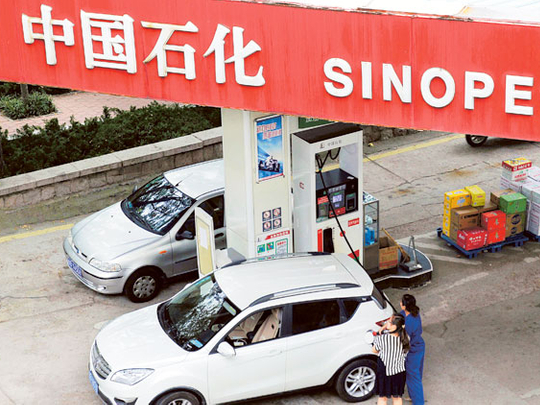
SHANGHAI: Chinese oil giant Sinopec will sell a 30 per cent stake in its marketing arm to outside investors for more than $17 billion (Dh62 billion), the company said, as the government pushes key economic reforms.
China’s Communist Party pledged at a meeting in November to allow the market to play a “decisive” role in the allocation of resources through a number of policies, including prodding state companies to operate on more commercial terms.
The move by Sinopec, initially proposed by the firm in February, has been hailed by state media as the first among the nation’s three largest energy firms to introduce more diversified ownership.
“The sale of its marketing arm “is in line with their policy of privatisation and to introduce more private capital in the economy”, independent financial analyst Francis Lun told AFP.
Separately, Sinopec parent China Petrochemical Corp. will purchase assets from Sinopec Yizheng Chemical Fibre Company, worth 6.49 billion yuan (Dh3.88 billion), both firms said in a filing late on Friday. The move is part of a plan by China Petrochemical to float its oilfield assets without the cost of a separate listing.
However, investors were not impressed. In Shanghai, Sinopec was down 0.71 per cent at the close on Monday, while its Hong Kong-listed shares sank 6.76 per cent.
But Yizheng Chemical’s shares soared more than 80 per cent in Hong Kong, while the benchmark Hang Seng Index fell 0.97 per cent.
“It’s purchasing assets from Yizheng Chemicals that are losing money, that’s something that the market doesn’t like,” Simsen International Financial Group associate director Jackson Wong told AFP.
Yizheng saw a net loss of 1.75 billion yuan in the first half of the year.
Under the terms for Sinopec’s marketing arm, 25 investors will buy a combined 29.99 per cent share in the marketing company, leaving Sinopec with 70.01 per cent, for 107.09 billion yuan ($17.42 billion), Sinopec said late Sunday in a statement to the Hong Kong stock exchange.
The marketing unit is engaged in the distribution of petrol, diesel and jet fuel through more than 30,000 service stations, it said.
The stakeholders were mainly Chinese investment firms and insurance companies, including vehicles of Shanghai-based conglomerate Fosun, Internet giant Tencent and China Life Insurance Co., the list showed.
Foreign-linked investors include a subsidiary of ICBC Credit Suisse Asset Management Co., a joint venture between China’s largest bank and the Swiss financial services giant.
No foreign oil firms were among the investors. Sinopec said previously it would not accept investors that could have a “conflict of interest” with the marketing arm or the parent company.
The official Xinhua news agency said investors included 11 privately owned companies.
The deal still requires approval by China’s Ministry of Commerce, according to the statement.
Sinopec last month announced its net profit for the first half of 2014 rose 7.5 per cent year-on-year to 32.54 billion yuan, despite weaker domestic demand for oil products.











